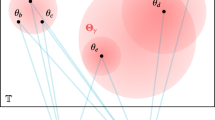Summary
The degree of corroboration of a scientific hypothesis is an issue that has been repeatedly discussed in modern theory of sciences (e. g. Popper, 1969). In a preceding paper (Grüsser 1983) it was shown that the formulae advanced by Popper to calculate the degree of corroboration C (h, e) are not very satisfactory because the probability values required in the computation of C (h, e) are not available as a rule. Another equation to measure (or define) the degree of corroboration B (h, e) was proposed (eq. (1)), whereby only the number n of unsuccessful efforts to falsify a scientific hypothesis by means of adequate experiments or observations is needed to be known. Shortly after the publication of these ideas I discovered that Nicolaus Cusanus (1401–1464) in his book “De docta ignorantia” had proposed a model of scientific “verisimilitude” which leads to a quite similar relationship between B (h, e) and the number n of independent proofs or observations. The “polygonal” model of verisimilitude (eq.(4)) mentioned by Cusanus is presumably the first quantitative estimate proposed for this problem in philosophical literature.
Similar content being viewed by others
LiteraturLiteraturverzeichnis
Cusa, Nicolai de (1440): „De docta ignorantia. Die belehrte Unwissenheit“. Buch I–III, übers. von P. Wilpert und H.G. Senger, Lateinisch-Deutsch. Hamburg: F. Meiner, 152 p., 183 p., 236 p., 1977/1979.
Cusa, Nicolai de (1444): „De coniecturis — Mutmaßungen“. Lateinisch-Deutsch, übers. von J. Koch, U. W. Happ. Hamburg: F. Meiner, 264 p., 1971.
Cusa, Nicolai de (1448): „Der Laie über die Weisheit (Idiota de sapientia)“. Herausg. E. Bohnenstädt, Hamburg: F. Meiner 1977, 108 p.
Cusa, Nicolai de (1448): „Liber de mente“, übers. von H. Cassirer, Herausg. J. Ritter, in: E. Cassirer: „Individuum und Kosmos in der Philosophie der Renaissance“, Darmstadt: Wissenschaftliche Buchgesellschaft 1977, p. 203–297.
Cusa, Nicolai de (1464): „Compendium“ (kurze Darstellung der philosophisch-theologischen Lehren), übers. B. Decker, K. Bormann, Hamburg: F. Meiner 1982, 110 p.
Diels, H. (1972): „Die Fragmente der Vorsokratiker“. Griechisch und Deutsch, Band I, II, Herausg. W. Kranz, Basel: Weidmann (16. Aufl.), 504 p. und 428 p.
Grüsser, O.-J. (1983): „Über den Grad der Bewährung naturwissenschaftlicher Hypothesen“. Z. allgem. Wissenschaftstheorie, 14, 273–291.
Leonardo da Vinci. „The notebooks of Leonardo da Vinci“, ed. E. MacCurdy, London: Reprint Soc. 1954, 2 Vol.
Nagel, F. (1984): Nicolaus Cusanus und die Entstehung der exakten Wissenschaften. Münster: Aschendorff, 172 p.
Popper, K. (1969): „Logik der Forschung“, 3. erw. Aufl. (1. Aufl. 1934), Tübingen: J. C. B. Mohr, 441 p.
Author information
Authors and Affiliations
Additional information
Die Arbeit entstand im Rahmen von neurobiologischen und neuropsychologischen Forschungsprojekten, die durch Sachbeihilfen der Deutschen Forschungsgemeinschaft (Gr.161) gefördert wurden.
Rights and permissions
About this article
Cite this article
Grüsser, OJ. Ein Erkenntnismodell des Nikolaus von Kues und der Grad der Bewährung einer wissenschaftlichen Hypothese. Zeitschrift für Allgemeine Wissenschaftstheorie 19, 232–238 (1988). https://doi.org/10.1007/BF01801336
Issue Date:
DOI: https://doi.org/10.1007/BF01801336




